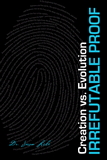“Secret Things!”
There are some questions that we, as fallible, finite human beings, cannot provide ultimate answers to.
‘If angels were perfect when created, why did Lucifer become so evil?’—‘Why would Eve listen to a talking snake?’—‘Why did God create people if he knew so many would end up in hell?’
These are just some of the many ‘interesting’ questions AiG speakers have been asked at various conferences.
Now, it is true that Answers in Genesis exists as a ministry to provide answers to questions concerning the Bible, particularly in Genesis. In fact, because of all the scientific and theological research conducted by qualified people associated with AiG, we do provide lots of answers—so we can do what is commanded in 1 Peter 3:15:
‘
Always be prepared to give an answer to everyone who asks you to give the reason for the hope that you have. But do this with gentleness and respect.’
At the same time, however, it’s also true that there are many questions we can’t answer. Some involve scientific issues that need more research. (When I was a teenager, many answers now available in the resources we carry were simply not there.)
But there are some questions that we, as fallible, finite human beings, cannot provide ultimate answers to.
Demanding answers
At the end of a recent conference, three young men came up to me and almost demanded answers to two of the questions above (the talking serpent in Genesis 3, and how could a good God have created Lucifer, knowing how evil he would become).
I can certainly attempt to offer some sort of answer to such questions, but ultimately, I can’t give detailed answers, for the questions relate to matters God hasn’t revealed to us.
When confronted with such questions, I’m reminded of Deuteronomy 29:29: ‘The secret things belong unto the Lord our God: but those things which are revealed belong unto us and to our children forever, that we may do all the words of this law.
’
What lessons can we all learn from this? First, regarding the things that God has clearly revealed in His Word, we can know them for sure, and speak authoritatively about them (e.g. the bodily Resurrection of Christ, the global Flood, etc.). We can also often conduct scientific research to show that science does confirm the Bible’s statements.
For example, we can dogmatically assert that God created distinct kinds of animals and plants to reproduce after their own kind (Genesis 1). Research concerning genetics, information theory and natural selection all confirm the Bible’s teaching—as we would expect because the Bible is God’s infallible Word.
There are an infinite number of things God hasn’t revealed to us. Such matters are the ‘secret’ things of God, and we should not be embarrassed if we can’t give detailed answers.
I do find, however, that many times (like the incident above), people ask such questions because, having heard so many things in my lectures that confirmed God’s Word, they thought that by asking questions I wouldn’t be able to answer, it would give them a way out. In other words, they didn’t have to believe the Bible.
As I watched them walk away believing they had stumped me, I couldn’t help but think of verses like John 3:19: ‘And this is the condemnation, that light is come into the world, and men loved darkness rather than light, because their deeds were evil.
’
Argue, confute, dispute
Pastor rejects a creator
A pastor who’s an atheist? His congregation actually demands his return? What’s going on?
The Lutheran Church in Denmark doesn’t know what to do with Thorkild Grosboell, since he’s told a newspaper that he believes ‘there is no heavenly God, there is no eternal life, there is no resurrection.’
His new book A Stone in the Shoe exposes the underlying cause of his atheism: ‘What is faith in a world where a technical, scientific rationality has made it impossible to believe in the story of creation, a virgin birth, paradise, resurrection, eternal life and an out-of-date God?’
For details, see Pastor Openly Rejects the Creator.
It reminds me that ultimately the battle we’re involved in is a spiritual one. We need to be like the Apostle Paul and use as many arguments as we can to convince people of the truth (we need to ‘argue,’ confute, powerfully dispute, etc.). However, in this ‘foolishness of preaching
’ (1 Cor. 1:21), we need to recognize that it is God who ultimately opens the heart of man who is ‘dead in trespasses and sin
’ (Eph. 2:1).
As I talked to the young men, I turned the conversation to things related to biology, geology, etc., that I had already shared, which confirmed over and over again that the Bible is what it claimed to be: the revealed Word of God.
But they kept coming back to questions we can’t give detailed answers to. This was their excuse why they didn’t have to believe God’s Word.
So, all we can do is pray that God would now use the words that were preached and His Word to bring them to a knowledge of the truth.
Praise God that for every person like that, we’ve seen many who have had their hearts opened. Dr Monty White of AiG–England just wrote to tell me of a man who had gone to one of my meetings in Coventry to ‘hear an idiot say he believed the Bible.’
Well, after a couple of minutes he was ‘hooked,’ and by the end of the meeting was totally convinced that he could trust the Bible. He started attending church and within weeks he was gloriously converted.
And that’s what it’s all about!
Recommended Resources

Answers in Genesis is an apologetics ministry, dedicated to helping Christians defend their faith and proclaim the good news of Jesus Christ.
- Customer Service 800.778.3390
- Available Monday–Friday | 9 AM–5 PM ET
- © 2026 Answers in Genesis






